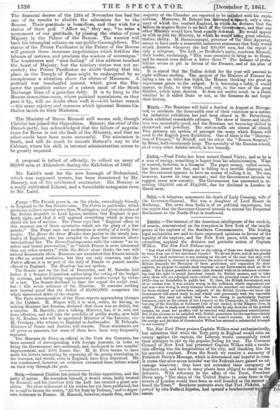lannits,.—The interest of the American intelligence of the week is,
of course, concentrated on the reception in New York of the intelli- gence of the capture of the Southern Commissioners. The leading legal authorities are said to have expressed opinions in favour of the legality of the capture, and the New York press, with scarcely an exception, applaud the decisive and patriotic action of Captain Wilkes. The New York Tribune says : "But what will Great Britain say to the taking of these two world-be envoys by force from one of her merchant vessels? We do not know, and do not greatly care. We shall endeavour to say nothing on the law of the case that may even seem calculated to forestal or embarrass the action of our Government. If Great Britain demands the liberation of these gentlemen, and reparation for their capture, we propose to sustain such response as our Government shall see fit to make. For it is not possible to make such demand without in substance confess- ing that the right to search American vessels for British seamen, and to take away those who are adjudged such—which was the principal cause of the war of 1812—has no foundation in public law. If, then, the British Government sees fit to confess that it was utterly wrong in the collisions which engendered our last war—was wrong in every instance wherein she searched our merchant ships for those claimed as native-born subjects of the British Crown—we trust our Government will stand ready to deal wisely and generously with the venerable penitent. She need not admit that she was wrong in particularly flagrant instances, such as the attack of the Leopard on the Chesapeake, in 1808, and the burning of the Caroline at Schlosser (one of our docks) in the Niagara river, in 1888. If she is ready now to establish and abide by any doctrine on the general subject, we trust her proffers will be received with distinguished consideration. But if she chooses to be satisfied with British precedents for the case immediately in hand, she can be supplied with them to her heart's content. In either case, the energy and decision of Commander Wilkes has secured a substantial triumph to our country."
The New York Times praises Captain Wilkes most enthusiastically, but calculates that while the Tory party in England would raise an outcry against the captain, the Liberals would successfully resist. their attempts to stir up the popular feeling for war. The Common Council of New York had presented Captain Wilkes with a resolu- tion offering him the hospitalities of the city, and thanking him for his patriotic conduct. From the South we receive a summary of President Davis's Message, which is determined and hopeful in tone. It states that after seven months' war the Federals have gained no ad- vantage whatever : they have not extended their occupancy of i Southern soil, and have in many places been obliged to stand on the defensive. With reference to the affair of the Trent, President Davis says, "The claim of the United States to seize them in t streets of London would have been as well founded as the seizure' board the Trent." Southern accounts state that Fort Pickens, ported by two Federal frigates, had opened a bombardment' sacola.






























 Previous page
Previous page